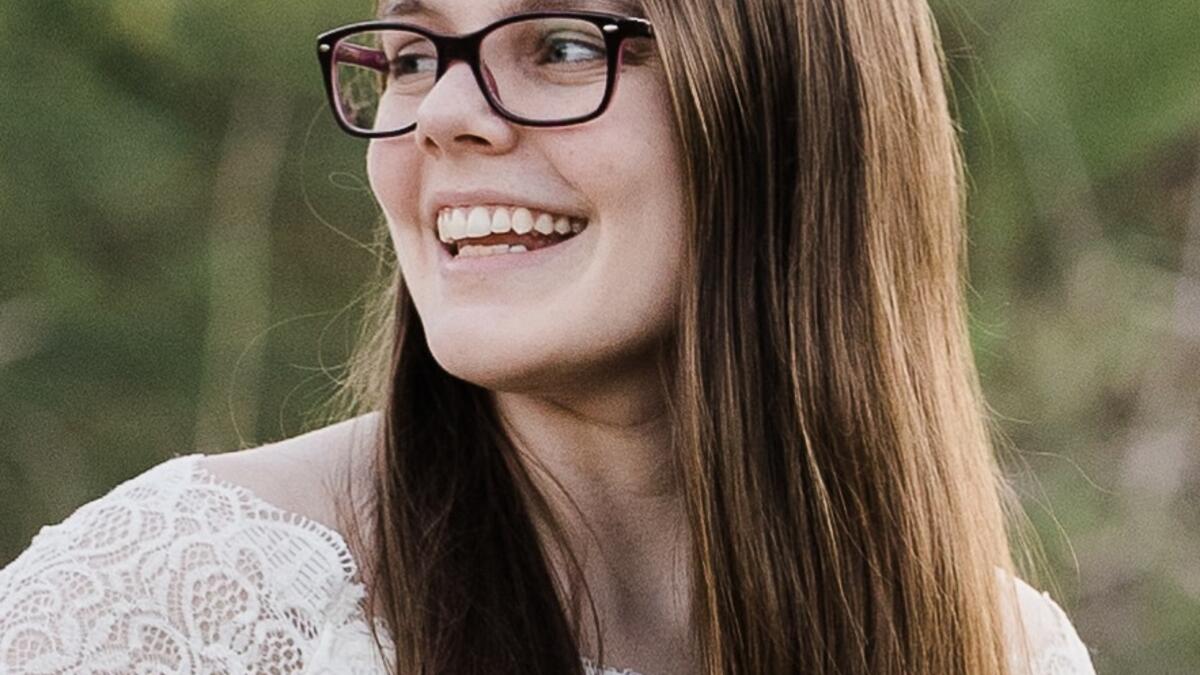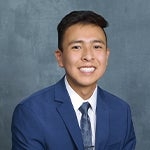2 ASU students awarded Udall Scholarship

Katie Pascavis, a junior who is pursuing dual degrees in mechanical engineering and public health, with a minor in sustainability, has been named a Udall Scholar.
The Lorraine W. Frank Office of National Scholarships Advisement (ONSA) has announced that two Arizona State University students, Katie Pascavis and Dylan Bia, have been awarded the Udall Undergraduate Scholarship, a major federal fellowship for college sophomores and juniors who demonstrate leadership, public service and commitment to issues related to Native American nations or to the environment.
ASU student Nicole Kaiser has also been named an honorable mention.
Since the program’s inception in 1997, a total of 41 ASU students have been selected as Udall Scholars, ranking ASU first among all U.S. institutions, ahead of the University of Montana, Cornell and Yale. The most recent previous ASU recipients are Nathanial Ross in 2021 and Nekiyah Draper, Tahiry Langrand and Grant Real Bird in 2020.
The Udall Scholarship is a program of the Udall Foundation, which was established by the U.S. Congress as an independent executive branch agency to honor Rep. Morris K. Udall's lasting impact on this nation's environment, public lands and natural resources, and his support of the rights and self-governance of American Indians and Alaska Natives. In 2009, the name of the foundation was amended to include Stewart L. Udall, who served as secretary of the interior from 1961 to 1969.
The scholarship provides up to $7,000 for eligible academic expenses, access to the Udall Alumni Network and an invitation to a five-day scholar orientation in Tucson, where the incoming cohort of Udall Scholars participate in networking and professional development activities.
The award is open to full-time sophomores and juniors at any accredited academic institution in the U.S.
Students may apply in one of three areas: tribal policy, Native health care or environment. Those who apply in the policy or health care categories must be Native Americans or Alaska Natives.
“What I admire about the Udall Scholarship is how inclusive and values-driven it is,” said Kyle Mox, associate dean of national scholarship advisement. “Udall Scholars are selected on the basis of how they demonstrate their commitment to civility, integrity and consensus. These are the values demonstrated by the Udalls in their public service careers, and I think we can all agree that they are qualities that we want to promote in the next generation of leaders.”
A junior at Barrett, The Honors College, Pascavis is pursuing dual degrees in mechanical engineering and public health, with a minor in sustainability. A Flinn Scholar, she also received the Goldwater Scholarship earlier this year in recognition of her outstanding achievements in STEM research.
An honorable mention for the Udall Scholarship in 2020, Bia is a member of the Leadership Scholarship Program at ASU and is both a Pat Tillman and Chief Manuelito Scholar. He also has participated in research at ASU-Banner, the University of Utah and the University of Arizona with various initiatives addressing Native American health issues.
“The news was a humbling experience to share with my family members and advisors,” Bia said about hearing he had been awarded the scholarship. “Being an honorable mention from the previous year made the news so much more rewarding knowing the extra effort put in was worthwhile. I am honored to receive this prestigious scholarship and appreciate the support from my family and advisors on my journey.”
Another step in the journey
Dylan Bia. Photo courtesy ONSA
A member of the Navajo Nation, Bia plans to follow in the footsteps of his older brother and become a physician and work in rural, tribal communities to provide better access to quality health care.
“I had various influences that made me pursue medicine,” Bia said. “My parents taught me the importance of serving native communities and I observed my grandfather as a traditional medicine man healing community members. My older brothers completed their education in medicine and solidified my intentions of pursuing medicine by all my family influences.”
Bia began the journey toward a career in health care by going through the medical assisting program at the East Valley Institute of Technology while finishing high school at Corona Del Sol in Tempe, Arizona. In addition to his efforts relating to medicine, Bia also serves the ASU community with roles in organizations such as Changemaker Central and the Alliance of Indigenous People Coalition.
“Being heavily involved in the Indigenous community was my personal goal when I started here at ASU,” Bia said. “I had the honor to be one of the main facilitators for the Alliance of Indigenous Peoples, a coalition that represents an open community for Indigenous students. My involvement has expanded my connections, community support, and increased my skills as a student leader.”
Pascavis (pictured above) plans to become a university professor and create research groups that will continue her current work in clean-water technologies.
“Access to water and sanitation is such an important issue throughout the world,” Pascavis said. “It's important that we prepare for how global climate change is going to worsen the situation. I want to pursue environmental engineering to help protect the health of both global communities and the environment.”
She has served as president of Engineers Without Borders and spent several years as a student researcher in the Nanotechnology Enabled Water Treatment (NEWT) Engineering Research Center to discover new methods for eliminating bacteria in water, such as a “Germicidal Jellyfish,” a floating device that emits bacteria-killing UV light.
During the pandemic, Pascavis put her commitment to public health and sustainability, combined with her engineering and research skills, to work with the Luminosity Lab at ASU. These efforts have led to new methods to sanitize masks, the design of N95 alternatives and PPE advising to local hospitals. Currently, she is looking to leverage her technical expertise and assume national leadership roles.
“I was recently selected to the Global 4-H Youth Committee and am currently starting an initiative to encourage 4-Hers to pursue their own environmental action projects,” she said. “While it's a recent activity and it's still very much underway, I am incredibly excited at this idea because I grew up in 4-H, and it was such an important part of my life that taught me to take action in my own community.”
In August, Pascavis and Bia will travel to Tucson to participate in a five-day Udall Scholar orientation, which brings together the entire cohort of Udall Scholars from across the country to participate in leadership development programming, professional networking and in-depth case studies.
“The Udall orientation and the alumni network are really the most valuable parts of the scholarship,” Mox said. “Through these channels, the Udall Scholars can connect with other motivated, like-minded students from across the U.S. The experience helps to accelerate them toward their professional and personal aspirations.”
A community of support
Applicants for the Udall Scholarship must be nominated by their institution, and each college or university is limited in the number of students that it may nominate. At ASU, the process is managed through ONSA, which organizes a faculty committee to review and approve applications for nomination.
The primary recruiting and advising of applicants is done by Shay Masterson, program manager for outreach and inclusion at ONSA. To identify and then prepare likely candidates for the Udall Scholarship, Masterson collaborates with many different units at ASU, including the School of Sustainability and American Indian Student Support Services.
“Without the support of our partners throughout ASU, we would not be as successful at identifying, encouraging and guiding strong candidates for the Udall Scholarship,” Masterson said. “Faculty and staff with these units have been integral from the beginning of the application process through the end. Since they work so closely with the students in their respective units, they are able to connect ONSA with likely nominees, and often, they go even further, providing one-on-one mentorship to applicants, as well as serving on the selection committees.”
Kaiser, a junior in the College of Life Sciences and Barrett, The Honors College, was identified as an honorable mention. She has collaborated with Tempe City Council and Hoverlay to increase the bat population near Tempe Town Lake. Kaiser also assists with researching the dynamics of infectious diseases at the ASU Biodesign Center of Environmental Health Engineering. After completing studies at ASU, Kaiser plans to do further research abroad before pursuing a PhD with an emphasis on biodiverse systems.
Current ASU students who are interested in applying for the Udall Scholarship in a future cycle can visit onsa.asu.edu to schedule an advising meeting.
Story submitted by the Office of National Scholarships Advisement.
More University news

Year in review: ASU's top stories for 2024
As the year draws to a close, ASU News is revisiting some of the university's biggest stories in 2024 — from big announcements to…

ASU earns 'Gold' in inaugural Times Higher Education Online Learning Ranking
Arizona State University continues to set the standard in online learning, having earned a Gold rating in the inaugural Times…
2024 President's Awards honor ASU projects for real-world impact
Ten Arizona State University programs were honored for their real-world solutions during the annual President’s Awards ceremony…
